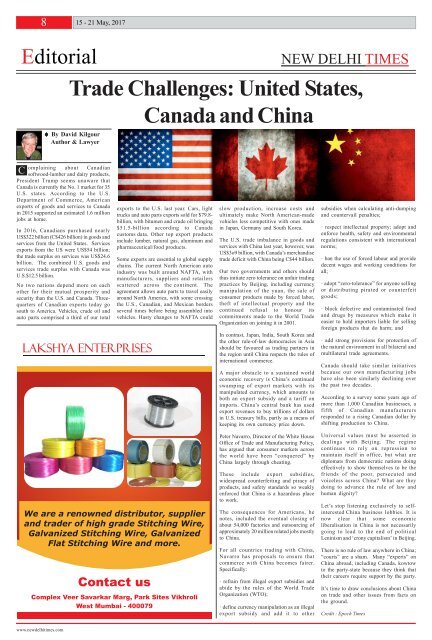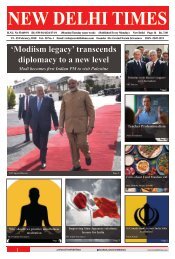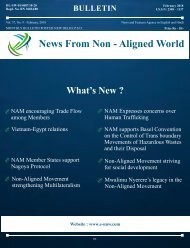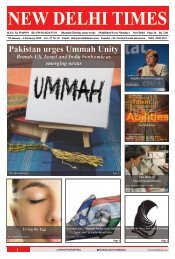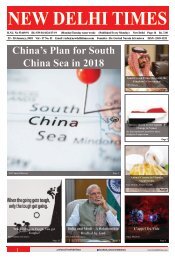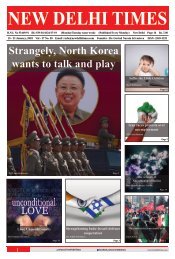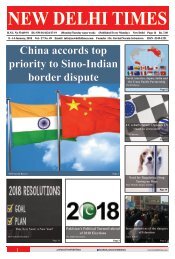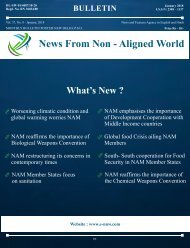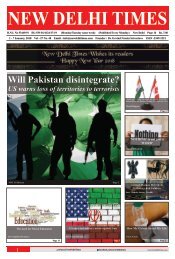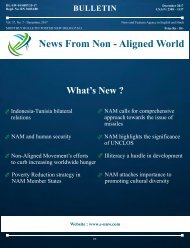15-21 may 2017-min
Create successful ePaper yourself
Turn your PDF publications into a flip-book with our unique Google optimized e-Paper software.
8 <strong>15</strong> - <strong>21</strong> May, <strong>2017</strong><br />
Editorial<br />
NEW DELHI TIMES<br />
Trade Challenges: United States,<br />
♦ By David Kilgour<br />
Author & Lawyer<br />
Canada and China<br />
C<br />
omplaining about Canadian<br />
softwood-lumber and dairy products,<br />
President Trump seems unaware that<br />
Canada is currently the No. 1 market for 35<br />
U.S. states. According to the U.S.<br />
Department of Commerce, American<br />
exports of goods and services to Canada<br />
in 20<strong>15</strong> supported an estimated 1.6 million<br />
jobs at home.<br />
In 2016, Canadians purchased nearly<br />
US$322 billion (C$426 billion) in goods and<br />
services from the United States. Services<br />
exports from the US were US$54 billion;<br />
the trade surplus on services was US$24.6<br />
billion. The combined U.S. goods and<br />
services trade surplus with Canada was<br />
U.S.$12.5 billion.<br />
No two nations depend more on each<br />
other for their mutual prosperity and<br />
security than the U.S. and Canada. Threequarters<br />
of Canadian exports today go<br />
south to America. Vehicles, crude oil and<br />
auto parts comprised a third of our total<br />
<br />
<br />
<br />
<br />
<br />
<br />
exports to the U.S. last year. Cars, light<br />
trucks and auto parts exports sold for $79.8-<br />
billion, with bitumen and crude oil bringing<br />
$51.5-billion according to Canada<br />
customs data. Other top export products<br />
include lumber, natural gas, alu<strong>min</strong>um and<br />
pharmaceutical/food products.<br />
Some exports are essential to global supply<br />
chains. The current North American auto<br />
industry was built around NAFTA, with<br />
manufacturers, suppliers and retailers<br />
scattered across the continent. The<br />
agreement allows auto parts to travel easily<br />
around North America, with some crossing<br />
the U.S., Canadian, and Mexican borders<br />
several times before being assembled into<br />
vehicles. Hasty changes to NAFTA could<br />
<br />
<br />
slow production, increase costs and<br />
ultimately make North American-made<br />
vehicles less competitive with ones made<br />
in Japan, Germany and South Korea.<br />
The U.S. trade imbalance in goods and<br />
services with China last year, however, was<br />
US$3o9 billion, with Canada’s merchandise<br />
trade deficit with China being C$44 billion.<br />
Our two governments and others should<br />
thus initiate zero tolerance on unfair trading<br />
practices by Beijing, including currency<br />
manipulation of the yuan, the sale of<br />
consumer products made by forced labor,<br />
theft of intellectual property and the<br />
continued refusal to honour its<br />
commitments made to the World Trade<br />
Organization on joining it in 2001.<br />
In contrast, Japan, India, South Korea and<br />
the other rule-of-law democracies in Asia<br />
should be favoured as trading partners in<br />
the region until China respects the rules of<br />
international commerce.<br />
A major obstacle to a sustained world<br />
economic recovery is China’s continued<br />
swamping of export markets with its<br />
manipulated currency, which amounts to<br />
both an export subsidy and a tariff on<br />
imports. China’s central bank has used<br />
export revenues to buy trillions of dollars<br />
in U.S. treasury bills, partly as a means of<br />
keeping its own currency price down.<br />
Peter Navarro, Director of the White House<br />
Office of Trade and Manufacturing Policy,<br />
has argued that consumer markets across<br />
the world have been “conquered” by<br />
China largely through cheating.<br />
These include export subsidies,<br />
widespread counterfeiting and piracy of<br />
products, and safety standards so weakly<br />
enforced that China is a hazardous place<br />
to work.<br />
The consequences for Americans, he<br />
notes, included the eventual closing of<br />
about 54,000 factories and outsourcing of<br />
approximately 20 million related jobs mostly<br />
to China.<br />
For all countries trading with China,<br />
Navarro has proposals to ensure that<br />
commerce with China becomes fairer.<br />
Specifically:<br />
· refrain from illegal export subsidies and<br />
abide by the rules of the World Trade<br />
Organization (WTO);<br />
· define currency manipulation as an illegal<br />
export subsidy and add it to other<br />
subsidies when calculating anti-dumping<br />
and countervail penalties;<br />
· respect intellectual property; adopt and<br />
enforce health, safety and environmental<br />
regulations consistent with international<br />
norms;<br />
· ban the use of forced labour and provide<br />
decent wages and working conditions for<br />
all;<br />
· adopt “zero-tolerance” for anyone selling<br />
or distributing pirated or counterfeit<br />
goods;<br />
· block defective and conta<strong>min</strong>ated food<br />
and drugs by measures which make it<br />
easier to hold importers liable for selling<br />
foreign products that do harm; and<br />
· add strong provisions for protection of<br />
the natural environment in all bilateral and<br />
multilateral trade agreements.<br />
Canada should take similar initiatives<br />
because our own manufacturing jobs<br />
have also been similarly declining over<br />
the past two decades.<br />
According to a survey some years ago of<br />
more than 1,000 Canadian businesses, a<br />
fifth of Canadian manufacturers<br />
responded to a rising Canadian dollar by<br />
shifting production to China.<br />
Universal values must be asserted in<br />
dealings with Beijing. The regime<br />
continues to rely on repression to<br />
maintain itself in office, but what are<br />
diplomats from democratic nations doing<br />
effectively to show themselves to be the<br />
friends of the poor, persecuted and<br />
voiceless across China? What are they<br />
doing to advance the rule of law and<br />
human dignity?<br />
Let’s stop listening exclusively to selfinterested<br />
China business lobbies. It is<br />
now clear that some economic<br />
liberalisation in China is not necessarily<br />
going to lead to the end of political<br />
Leninism and ‘crony capitalism’ in Beijing.<br />
There is no rule of law anywhere in China;<br />
“courts” are a sham. Many “experts” on<br />
China abroad, including Canada, kowtow<br />
to the party-state because they think that<br />
their careers require support by the party.<br />
It’s time to draw conclusions about China<br />
on trade and other issues from facts on<br />
the ground.<br />
Credit : Epoch Times<br />
www.newdelhitimes.com


